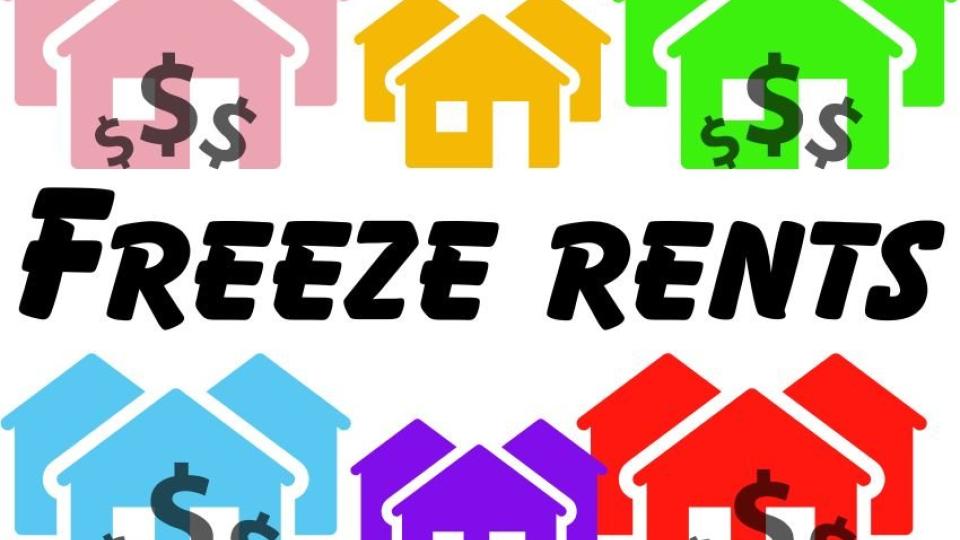There are solutions to the rental crisis

Freeze rents
Record-breaking rent rises, as much as 10% in the past 12 months, have been recorded in all cities for the first time in more than a decade. Rents have continued to rise despite wages stagnating.
At the same time, vacancy rates hit a record low of 0.8% in March. It is now common to see queues of more than 100 people waiting to inspect an available rental unit. Renters are being forced to bid higher and higher prices to compete for rentals.
A new report released by Anglicare Australia for Everybody’s Home, Priced Out: An index of affordable rentals for Australia’s essential workers, found that, on average, essential workers are spending two thirds of their income on rents.
The report compared rent data against award wages and found that in some occupations a worker could earn double the award wage and still be in rental stress.
Rental “stress” for low-income households is calculated as those needing to spend more than 30% of their income on rent.
Priced Out found that since 2020 workers have lost an average of six hours of income a week to rent rises.
“Essential workers are the backbone of our communities, yet they are being priced out of them because of the unsustainable rises in rents. More and more essential workers are being pushed into serious rental stress,” Everybody’s Home spokesperson Maiy Azize said.
More than 1 million households were already living in housing stress in 2017–18, according to a report by the federal government’s Australian Institute of Health and Welfare.
The Housing Affordability Snapshot 2021 also found that more than 51% of renters live in properties that need repairs: poorer renters can be evicted at the whim of landlords, allowing them to raise rents while leaving the property in disrepair.
Looking in all the wrong places, the corporate media is blaming the housing crisis on “high” immigration and “NIMBYism”. The Australian Financial Review said on April 6 that “an influx of 650,000 migrants” was driving “the race for space”.
Blaming international students, working holidaymakers and skilled migrants for skyrocketing rents is a blatant attempt to distract from the bipartisan profits-first housing system.
House prices and rents have continued to skyrocket over the past decade — including during the pandemic when borders were closed — due to a number of financial arrangements that seek to make housing an investment.
Negative gearing and capital gains tax concessions have made housing an attractive prospect for investors, pricing out people looking to purchase a home or find a rental close to their workplace.
Speculators are happy to let homes sit empty, their value continuing to rise, while thousands have to live on the streets, in their cars or in overflowing emergency accommodation. We need a “use it or lose it” policy to purchase unused dwellings for public ownership.
More than 100,000 properties are being used as Airbnbs and other short-stay rentals, further reducing available rental stock.
Public housing stock has also been eroded, falling to just 3% of all housing. Successive governments, across various states, have attempted to sell off and privatise public housing assets when we really need a massive public housing build for people to be able to live in dignity.
Along with the erosion of public housing has been a tightening of the eligibility criteria. Now, public housing is viewed as “welfare housing”, rather than an essential part of a functioning society, like public transport, public healthcare and public education.
Even when workers are able to scrape together enough money to afford a deposit on a house or unit, there are no guarantees the property will be liveable, due to the privatisation of building certification processes that have left many living in properties with construction defects and structural issues.
Housing activists and others want a rent freeze to stop the annual or biannual rent rises that make renting more and more unaffordable.
The Socialist Alliance (SA) has joined this call, but believes that proposals such as Queensland Labor’s to limit rent rises to once per year do not go far enough.
Housing is a human right. Rents need to be frozen for ten years, so that wages can catch up.
Solutions to guarantee housing for all would dismantle the developer and investor-driven policies that allow the housing crisis to continue.
It would mean: scrapping the capital gains tax concessions and negative gearing arrangements; embarking on a large-scale construction of good quality, sustainable public housing and repairing and upgrading existing sites; establishing publicly owned and controlled not-for-profit public housing construction enterprises to oversee this expansion and maintenance; appropriating all properties left vacant for more than a year for public housing stock; and expanding financial assistance for low income earners.
Renters also need more rights, especially in New South Wales where landlords can evict a tenant during an on-going lease, or at the end of a fixed-term one, without giving any reason.
This is why SA is committed to helping build a broad, grassroots movement that can achieve these bold, but necessary, goals.
[Isaac Nellist is a renter and a member of the Socialist Alliance national executive.]